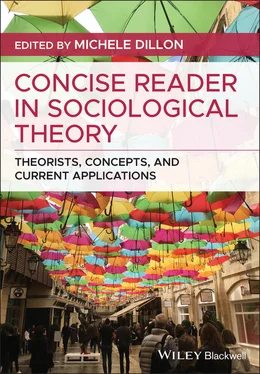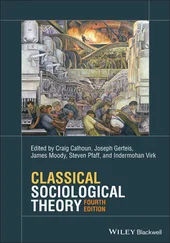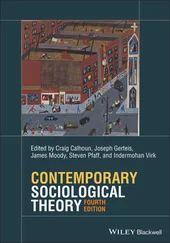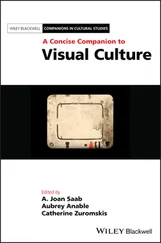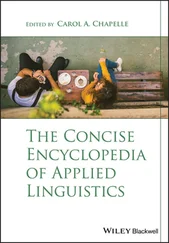220 226
221 227
222 228
223 229
224 230
225 231
226 232
227 233
228 234
229 235
230 236
231 237
232 238
233 239
234 240
235 241
236 242
237 243
238 244
239 245
240 246
241 247
242 248
243 249
244 250
245 251
246 252
247 253
248 254
249 255
250 256
251 257
252 258
253 259
254 260
255 261
256 263
257 264
258 265
259 266
260 267
261 268
262 269
263 270
264 271
265 272
266 273
267 274
268 275
269 276
270 277
271 278
272 279
273 280
274 281
275 282
276 283
277 284
278 285
279 286
280 287
281 288
282 289
283 290
284 291
285 292
286 293
287 294
288 295
289 296
290 297
291 298
292 299
293 300
294 301
295 302
296 303
297 304
298 305
299 306
300 307
301 308
302 309
303 310
304 311
305 312
306 313
307 314
308 315
309 316
310 317
311 318
312 319
313 320
314 321
315 322
316 323
317 324
Concise Reader in Sociological Theory
Theorists, Concepts, and Current Applications
EDITED BY
Michele Dillon

This edition first published 2021
Editorial material and organization © 2021 John Wiley & Sons Ltd
All rights reserved. No part of this publication may be reproduced, stored in a retrieval system, or transmitted, in any form or by any means, electronic, mechanical, photocopying, recording or otherwise, except as permitted by law. Advice on how to obtain permission to reuse material from this title is available at http://www.wiley.com/go/permissions.
The right of Michele Dillon to be identified as the author of the editorial material in this work has been asserted in accordance with law.
Registered Offices John Wiley & Sons, Inc., 111 River Street, Hoboken, NJ 07030, USA John Wiley & Sons Ltd, The Atrium, Southern Gate, Chichester, West Sussex, PO19 8SQ, UK
Editorial Office 9600 Garsington Road, Oxford, OX4 2DQ, UK
For details of our global editorial offices, customer services, and more information about Wiley products visit us at www.wiley.com.
Wiley also publishes its books in a variety of electronic formats and by print‐on‐demand. Some content that appears in standard print versions of this book may not be available in other formats.
Limit of Liability/Disclaimer of Warranty While the publisher and authors have used their best efforts in preparing this work, they make no representations or warranties with respect to the accuracy or completeness of the contents of this work and specifically disclaim all warranties, including without limitation any implied warranties of merchantability or fitness for a particular purpose. No warranty may be created or extended by sales representatives, written sales materials or promotional statements for this work. The fact that an organization, website, or product is referred to in this work as a citation and/or potential source of further information does not mean that the publisher and authors endorse the information or services the organization, website, or product may provide or recommendations it may make. This work is sold with the understanding that the publisher is not engaged in rendering professional services. The advice and strategies contained herein may not be suitable for your situation. You should consult with a specialist where appropriate. Further, readers should be aware that websites listed in this work may have changed or disappeared between when this work was written and when it is read. Neither the publisher nor authors shall be liable for any loss of profit or any other commercial damages, including but not limited to special, incidental, consequential, or other damages.
Library of Congress Cataloging‐in‐Publication Data Names: Dillon, Michele, 1960– editor. Title: Concise reader in sociological theory : theorists, concepts, and current applications / edited by Michele Dillon. Description: First Edition. | Hoboken : Wiley, 2020. | Includes index. Identifiers: LCCN 2020029242 (print) | LCCN 2020029243 (ebook) | ISBN 9781119536185 (paperback) | ISBN 9781119536192 (adobe pdf) | ISBN 9781119536178 (epub) Subjects: LCSH: Sociology. | Social scientists. Classification: LCC HM585 .C65397 2020 (print) | LCC HM585 (ebook) | DDC 301–dc23 LC record available at https://lccn.loc.gov/2020029242LC ebook record available at https://lccn.loc.gov/2020029243
Cover Design: Wiley
Cover Image: Courtesy of Michele Dillon
Sociological theory offers a rich conceptual tool‐kit with which to think about and analyze our contemporary society. As we reflect upon what it means to live and to understand others in today’s complex world, the insights of sociological theorists provide us with concepts that greatly illuminate the array of social and institutional processes, group dynamics, and cultural motivations that drive the patterns of persistence and change variously evident across local, national, and global contexts. Sociology is a comparatively young discipline. It owes its origins to the principles and values established by eighteenth‐century Enlightenment philosophers, namely the core assumptions that human reason is the source of knowledge, and though of different orders, the source of moral truth and of scientific truth; and that, by virtue of being endowed with human reason, all people are created equal and thus should be free to govern themselves in all matters, including political governance – thus motivating the democratic revolutions of the eighteenth century in America (1776) and in France (1789) and leading to the decline of monarchies and the establishment instead of democratic societies.
It was the French philosopher Auguste Comte (1798–1857) who coined the term sociology in 1839. He was influenced by the Enlightenment emphasis on scientific principles and believed that a science of the social world was necessary to discover and illuminate based on rigorous empirical observation how society works, that is to identify, as he saw it, a “social physics” parallel to the laws of physics and other natural sciences, and to advance social progress as a result of the data yielded from the scientific study of society. In his view, because sociology could and should study all aspects of social life, he argued that sociology would be the science of humanity, the science of society, and would outline “the most systematic theory of the human order” (Comte 1891/1973: 1). Harriet Martineau (1802–76), the English feminist and writer, commonly regarded as the first woman sociologist, translated Comte’s writings into English in 1855 (Hoecker‐Drysdale 1992). Additionally, in her own influential writing she emphasized both the breadth of topics that sociologists can/should study as well as the importance of studying them with rigor and objectivity. In her well‐known book How to Observe Morals and Manners (1838), morals and manners referencing the substantive, wide‐ranging content of sociology (and its encompassing of social class, religion, health, suicide, pop culture, crime, and the arts, among other topics), Martineau also argued that because social life is human‐centered it is different to the natural world. Unlike atoms, for example, humans have emotions. Hence, Martineau pointed to the need for sociologists as scientists to develop the empathy necessary to the observation and understanding of the human condition and to how it manifests in the course of their inquiry. She wrote:
Читать дальше
